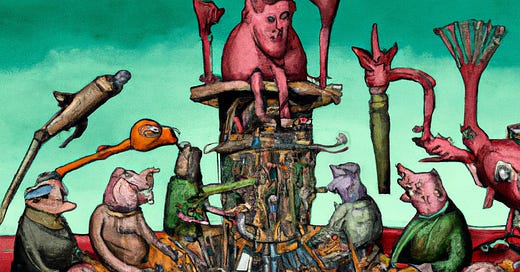Episode Thirty-Two: Bonfire of the Think Tanks
Barring a fairly major miracle, Labour are going to win the next election. Any reasonable probability of a Starmer majority should be over 90% and the central case should be a large majority. The British right faces well-deserved electoral oblivion. This should not be cause for despair. Starmer will be fiscally constrained and confronted with multiple major national crises: persistently high energy costs, weak growth, and mass illegal migration. Blair got a golden inheritance from Major. Starmer will not be so lucky. Moreover, voter loyalty is at historic lows. The Tory party could be reduced to fewer than 100 seats but still win the 2029 election.
Such a victory, however, will need both new cadres and ideological rejuvenation. The party of today is running low on ideas and talent. There are too many Tory MPs who possess not a single right-wing bone in their body but went into the party purely because of their class background (rich, posh, or rural: in different ways Zac Goldsmith and Alicia Kearns are both excellent examples). Of the more committed right-wing MPs, many are far too stupid or depraved to be allowed near ministerial positions (and so they are given knighthoods instead).
Think-tanks should serve as a source of both new ideas and as a pipeline for new talent. Today, however, virtually all the major right-wing think tanks are failing in at least half of this mission and many are failing in both. Several are run by malignant psychopaths who are utterly loathed by their own staff and have no wider mission beyond the maintenance of their own social position, or access to money/sex.
Policy Exchange and The Henry Jackson Society are the very worst examples, repulsive organizations that are essentially just a giant scam on their own donors. Both are such awful places to work due to the horrendous personal failings of senior management that they are actively impairing the flow of young talent into party politics. Both should be defunded and liquidated, their assets sold off so that nothing remains. The Institute for Economic Affairs is not as bad but is still similarly scammy, producing almost nothing of value for at least the last 15 years and coasting on its lingering reputation from the Thatcher years.
DALL-E’s take on a dysfunctional right-wing think tank.
More worthy organizations, however, still have deep issues. The Center for Policy Studies is a fine place in many ways. Rob Colvile is well liked, exquisitely well networked, and wrote the 2019 manifesto. CPS produces some very good work, especially on housing and tax. In other areas, however, its analysis is superficial and inconsistent, especially on energy. Superficial analysis is a particular problem because the civil service cannot be trusted to implement high-level ideas in a timely and faithful fashion: if you want to see your idea turned into policy, you need to give the relevant Minister and his special advisors something very close to oven-ready legislation. The whole is much less than the sum of the parts, in large part because CPS – like many of these organizations – lacks core funding and so management is forced to spend far too much time fundraising.
CPS is also a regular practitioner of the polling grift, although far from the worst offender. This consists of taking donor money to commission polling to produce counter-intuitive but ideologically convenient findings (“did you know that ACTUALLY the public really supports housebuilding/onshore wind/etc? - questions about revealed vs stated preferences will be deleted”). Many other right-wing organizations do this as well, because it is a very cheap way to buy headlines in the newspapers and therefore demonstrate impact to donors. This, of course, is a scam. Influence is not measured by headlines or even by how often Cabinet Ministers attend your jollies. It is measured by getting your ideas turned into policy. This is, in fact, the only thing that matters. Donors do not realize this and so are getting ripped off.
Policy Exchange, CPS, IEA, Civitas, and Legatum Institute are simply far too many roughly interchangeable right-wing organizations. They could all usefully be combined into one or at the very most two outfits. Nor is it is obvious why we need multiple vaguely postliberal think-tanks either (Onward, Centre for Social Justice, ResPublica). At the fringes, however, there is room for smaller organizations that do usefully occupy little niches, such as weirdo libertarianism (the Adam Smith Institute) or immigration skepticism (Migration Watch). The quality of work from these places ebbs and flows over the years but they clearly serve a purpose.
Fewer, bigger orgs would have more money to pay for and retain core talent, developing deep policy expertise across a rich range of areas. This would in turn massively upgrade the quality of advice and advisors that think tanks can offer ministers. Getting to this point, however, ultimately depends on the key donors becoming aware of the extent of the principal-agent problems within the current system. Today there seems to be little appetite for reform, but after next year, who can say?



